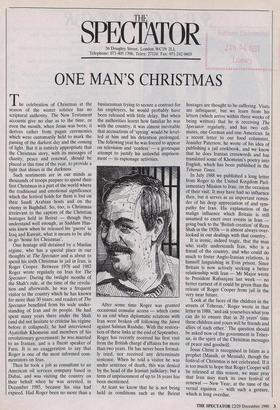56 Doughty Street, London WC1N 2LL Telephone: 071-405 1706; Telex:
27124; Fax: 071-242 0603
ONE MAN'S CHRISTMAS
The celebration of Christmas at the season of the winter solstice has no scriptural authority. The New Testament accounts give no clue as to the time, or even the month, when Jesus was born; it derives rather from pagan ceremonies which were customarily held to mark the passing of the darkest day and the coming of light; But it is entirely appropriate that the Christmas story, with its messages of charity, peace and renewal, should be placed at this time of the year, to provide a light that shines in the darkness. Such sentiments are in our minds as thousands of troops prepare to spend their first Christmas in a part of the world where the traditional and emotional significance which the festival holds for them is lost on their Saudi Arabian hosts and on the enemy in Baghdad. So, too, is Christmas irrelevant to the captors of the Christian hostages held in Beirut — though they understand well enough, as Saddam Hus- sein knew when he released his `guests' in Iraq and Kuwait, what it means to be able to go 'home for Christmas'. One hostage still detained by a Muslim regime, who has a special place in our thoughts at The Spectator and is about to spend his sixth Christmas in jail in Iran, is Roger Cooper. Between 1978 and 1982 Roger wrote regularly on Iran for The Spectator. During the twilight months of the Shah's rule, at the time of the revolu- tion and afterwards, he was a frequent visitor to the country which he has known for more than 30 years; and readers of The Spectator benefited from his wide under- standing of Iran and its people. He had spent many years there under the Shah (and did not hesitate to criticise his regime before it collapsed); he had interviewed Ayatollah Khomeini and members of his revolutionary government; he was married to an Iranian; and is a fluent speaker of Farsi. It is no exaggeration to say that Roger is one of the most informed com- mentators on Iran.
Then he took a job as consultant to an American oil services company based in Dubai, and was visiting the country on their behalf when he was arrested, in December 1985, because his visa had expired. Had Roger been no more than a businessman trying to secure a contract for his employers, he would probably have been released with little delay. But when the authorities learnt how familiar he was with the country, it was almost inevitable that accusations of 'spying' would be level- led at him and his detention prolonged. The following year he was forced to appear on television and `confess' — a grotesque attempt to justify his unlawful imprison- ment — to espionage activities.
After some time Roger was granted occasional consular access — which came to an end when diplomatic relations with Iran were broken off following the fatwa against Salman Rushdie. With the restora- tion of these links at the end of September, Roger has recently received his first visit from the British chargé d'affaires for more than two years. He has never been formal- ly tried, nor received any determinate sentence. When he told a visitor he was under sentence of death, this was denied by the head of the Iranian judiciary; but a term of imprisonment of up to 16 years has been mentioned.
At least we know that he is not being held in conditions such as the Beirut hostages are thought to be suffering. Visits are infrequent, but we learn from his letters (which arrive within three weeks of being written) that he is receiving The Spectator regularly, and has two cell- mates, one German and one American. In a recent letter to our food columnist, Jennifer Paterson, he wrote of his idea of publishing a jail cookbook, and we know that he does Iranian crosswords and has translated some of Khomeini's poetry into English, which has been published in the Teheran Times.
In July 1988 we published a long letter from Roger to the United Kingdom Parl- iamentary Mission to Iran, on the occasion of their visit. It may have had no influence then, but it serves as an important remin- der of his deep appreciation of and sym- pathy for Iran. His explanation of the malign influence which Britain is still assumed to exert over events in Iran going back to the 'British creation' of Reza Shah in the 1920s — is almost always over- looked in our dealings with that country. It is ironic, indeed tragic, that the man who really understands Iran, who is a friend of the country, and who could do much to foster Anglo-Iranian relations, is himself languishing in Evin prison. Since Britain is now actively seeking a better relationship with Iran — Mr Major wrote to President Rafsanjani last week — no better earnest of it could be given than the release of Roger Cooper from jail in the very near future.
`Look at the faces of the children in the streets of Teheran,' Roger wrote in that letter in 1988, 'and ask yourselves what you can do to ensure that in 20 years' time these children and yours will be friends and allies of each other.' The question should be asked now of the government in Teher- an, in the spirit of the Christmas messages of peace and goodwill.
Jesus Christ is recognised in Islam as a prophet (Massih, or Messiah), though the festival of Christmas is not celebrated. If it is too much to hope that Roger Cooper will be released at this season, we must pray that Iran may mark its own festival of renewal — New Year, at the time of the vernal equinox — with such a gesture, which is long overdue.


































































































 Previous page
Previous page